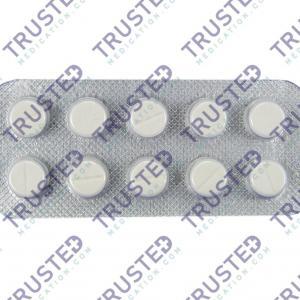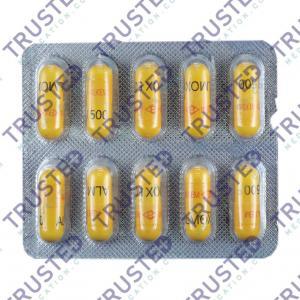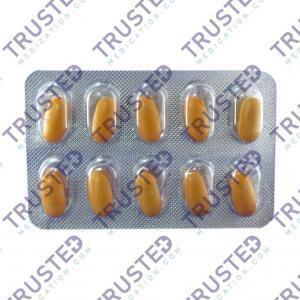Levofloxacin is a fluoroquinolone type of antibiotic that comes in tablet form of various strengths. It is used to treat a number of bacterial infections including:
- Sinus infections (sinusitis)
- Chest infections like pneumonia and chronic bronchitis
- Skin infections
- Urinary tract infections including those resistant to other antibiotics
- Chronic prostatitis infection
- Some types of gastroenteritis
- Bacterial infections that affect the kidney and prostate
- Infectious diarrhea due to E. coli. and Shigella bacteria
- Various obstetric infections such as mastitis or infection of the breast
- Prevention and treatment of plague due to Yersinia pestis
It is used along with other antibiotics to treat:
- Pelvic inflammatory diseases
- Meningitis
- Tuberculosis
Compare with other antibiotics of its kind, this medicine is slightly less popular as it is more expensive compared to similar alternatives. It is also associated with some serious and life-threatening side effects.
Levofloxacin is one of the most commonly prescribed antibiotics in the US. It is listed as one of the most essential medicines needed in the health system. It’s a broad-spectrum antibiotic that is active against gram-positive and gram-negative bacteria. As a fluoroquinolone type of antibiotic, it works by killing the bacteria. It interferes with the bacterial enzyme involved in the replication and repair of the bacterial DNA. Without the enzyme, bacteria won’t be able to reproduce themselves. This kills then and clears up the infection.
When and How to Use Levofloxacin
The dose of Levofloxacin depends on the type of infections.
- Nosocomial Pneumonia: Take 750 mg every 24 hours for 7 to 14 days.
- Community-acquired pneumonia: Take 500 mg every 24 hours for 7 to 14 days or take 750 mg every 24 hours for 5 days,
- Acute bacterial exacerbation of chronic bronchitis: Take 500 mg every 24 hours or 25o mg every 12 hours for 7 days.
- Acute bacterial sinusitis: Take 250 mg every 12 hours or 500 mg once a day for 10 to 14 days or 750 mg divided into three separate doses for 5 days.
- Chronic bacterial prostatitis: Take 500 mg every 24 hours for 28 days
- Urinary tract infection: Take 250 mg once a day for 3 days
- Skin and skin structure infections: Take 500 mg once a day for 7 to 10 days
- Dosage for plague: Take 500 mg once a day for 10 to 14 days
Take your medication exactly as directed by your physician or as written on the prescription label. For the oral tablet, you can take it with meals or on an empty stomach. Do not chew, break, or split the tablet. Drink plenty of fluids throughout the day to help prevent some unwanted effects.
Antibiotics work best when there is a constant amount in the blood. To do this, take your medicine at the same time each day or at an evenly spaced time. Do not miss a dose. If you happen to miss a dose, take it as soon as you remember. However, if it is almost time for you to take the missed dose, wait for your regular dosing schedule. Keep in mind that you can’t take vitamins or antacids while taking this medicine.
Possible Side Effects of Levofloxacin
Some common side effects of this drug include:
- Constipation
- Nausea and vomiting
- Headache
- Insomnia
- Diarrhea
Serious side effects are:
- Allergic reactions with signs like skin rashes, hives, trouble breathing, swelling of the face, lips, and tongue
- Central nervous system effects with signs like:
- Anxiety
- Depression
- Hallucination
- Nightmares
- Tremors
- Restlessness
- Suicidal thoughts
- Trouble sleeping
- Damages to the tendons with signs like:
- Reduced ability to move
- Pain
- Nerve damage in the legs, hands, arms, and feet with signs like:
- Weakness
- Numbness
- Pain
- Liver problems with signs like:
- Jaundice
- Light-colored bowel movement
- Dark-colored urine
- Nausea and vomiting
- Fever
- Fatigue
- Pain in the abdomen
What should I know before taking Levofloxacin?
- Levofloxacin can increase your risk of developing swelling of a fibrous tissue that connects the bones to a muscle during the treatment or up to several months afterward. These problems may affect the tendon in your hand, ankle, shoulder, and other parts of the body.
- This medicine may cause nerve damage and changes in your taste that may not go away even after you have stopped taking this medicine. If you will experience numbness, burning, pain, or weakness in your legs, and arms, stop taking this medicine and call your doctor as soon as possible.
- Do not drive or operate machinery while you take this drug as this can make you feel lightheaded or dizzy.
- Do not take Levofloxacin if you are pregnant or breastfeeding
- Use this medicine with caution among patients with:
- Kidney problems
- History of psychiatric illness
- Myasthenia gravis
- Diabetes
- Using corticosteroid medicines
- G6PD deficiency
- Heart disease such as a very slow heartbeat
- Low levels of potassium and magnesium in the blood
- History of having seizures
Getting the Best Result from Levofloxacin
- Levofloxacin can treat sinus infection, bronchitis, and urinary tract infection but it should be used only if there’s no other treatment option available.
- Antibiotics such as this drug can be effective in treating bacterial infections but it will not work against colds, flu, and other viral infections.
- Avoid prolonged sun exposure as this can make your skin sensitive to the effect of sunlight.
Finish the entire course of treatment even if you feel well. Stopping your medication will not clear up the infection and the bacteria will develop resistance to the antibiotic.









